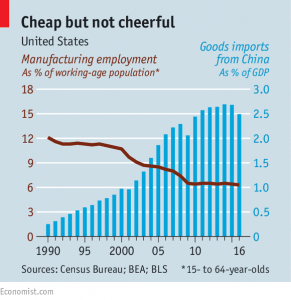Microeconomics throughout the years has always been ridiculed by other scientists, such as philosopher of science Alexander Rosenberg, for its seemingly weak ability to create valid empirical predictions or explanations. Although those are outside critiques, truth be told, economists also argue over the validity of each others works more often then one might think. More simply, there is not one universal way that economists look at empirically solving, predicating or explaining questions. Evidently, this generally creates huge competition in the field with inconclusive debates, and also supports the beliefs of critics. A recent article from The Economist provides a clear example of a day in the life of an economic researcher.
Nine separate studies recently published by David Autor, David Dorn and Gordon Hanson have shown that Chinese imports on America have led to a fall in manufacturing jobs between 1990-2007, in which one quarter could be attributed to a surge of Chinese imports.
Although this may seem like a reasonable or even valid study, the voices of dispute were not slow to come.
This eruption of comments and disputes appear rather frequently as fresh eyed economists who poke holes in the assumptions, data, and mathematical methodology the studies are based off of. In their paper, Autor et al. examined the impact of China’s import on America. They did so by using what economists called econometrics (statistical analysis). What makes this research rather debatable is that there are many ways in which the dependent variable (outcome/output) is measured. In this research specifically, economist Jonathan Rothwell from Gallup critiqued the researcher’s methodology. He confirmed that although their research was statistically significant, if the methodology was changed with the addition of other variables, the results would no longer be significant and therefore inconclusive. Although Rothwell did not disprove anything, he has at least led the researchers to question their claims and explanations for the decline in manufacturing jobs in the US.
In economics most research is thoroughly questioned before it can ultimately lead to a fact or generalization, however, that is not the point of all economics. But it leaves us with the question of what kinds of things can economics really truly predict vs. the explanations that are left unsolved.

